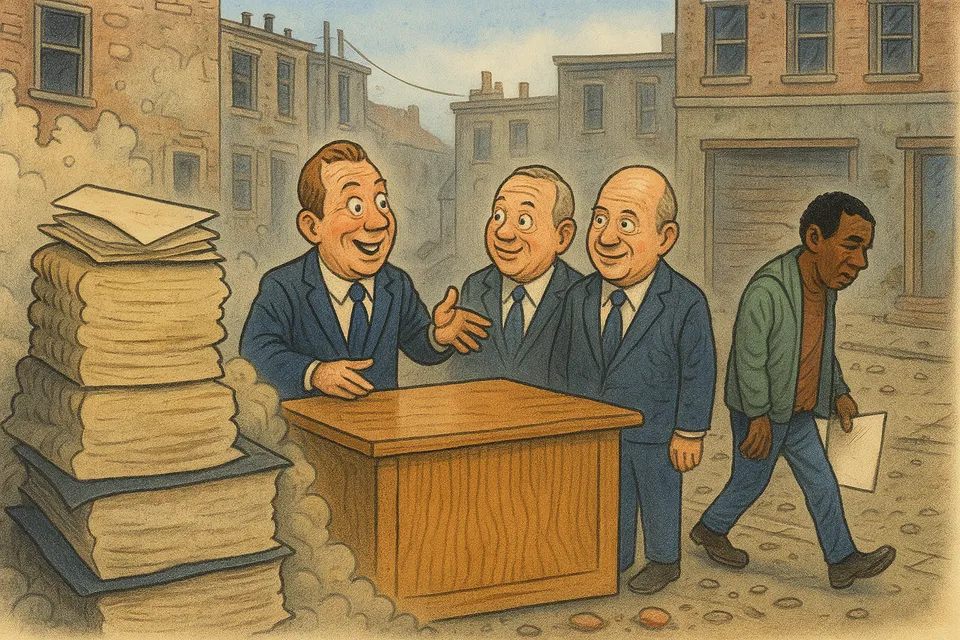UK Riots Taskforce: Another Commission to Study What Everyone Already Knows

Why Politicians Prefer Talking Shops Over Real Solutions
Britain launches yet another talking shop to examine why communities that have been systematically neglected for decades occasionally explode into violence.
Official claim: Government launches “independent commission” to tackle “root causes” of summer riots through “evidence-based recommendations” and nationwide community conversations.
What’s happening: Politicians create another inquiry to study problems that have been identified and ignored for decades, following the standard pattern of commissioning reports rather than implementing solutions already gathering dust from previous riots and inquiries.
The Riots and Their Causes
Eight months after riots swept through English towns following the Southport attacks, the political establishment has delivered its standard solution: an “Independent Commission on Community and Cohesion” that will spend months discovering what local authorities, police forces, and community workers have been reporting for years.
The commission, announced this week with the usual fanfare about “evidence-based recommendations” and “national conversations,” represents everything that is broken about how Britain responds to systemic failure. Rather than acknowledge decades of policy choices that have hollowed out working-class communities, politicians have once again opted for the comfortable distance of academic inquiry.
Sir Sajid Javid, the former home secretary co-leading this effort, noted that ministers have only responded “when tensions spill over, and too often ignoring the root causes.” This observation would carry more weight if Javid himself hadn’t spent years in government positions where addressing those root causes was literally his job.
The Commission Cycle
This latest panel follows a well-established pattern that has defined British governance for the past two decades. Crisis emerges, politicians express concern, independent body is established, recommendations are produced, recommendations are quietly shelved, nothing changes, crisis re-emerges.
The formula is so predictable it has become a form of institutional theatre. Select prominent figures from across the political spectrum, ensure representation from “all four nations,” promise to “listen directly” to affected communities, then disappear into months of evidence-gathering that will ultimately produce a report few will read and fewer will implement.
Consider the track record. After the 2001 riots in Oldham, Bradford, and Burnley, the Cantle Report identified community segregation and lack of meaningful contact between ethnic groups. After the 2011 riots, multiple inquiries examined social exclusion, police relations, and youth services cuts. After the 2005 London bombings, endless studies explored radicalisation and community cohesion.
Each produced sensible recommendations. All identified similar underlying issues: economic deprivation, social segregation, institutional mistrust, inadequate public services. Most recommendations were ignored or half-implemented. The problems persisted and periodically erupted.
Convenient Distance
What makes this commission particularly revealing is its deliberate positioning outside government structures. Though supported by the Ministry of Housing, Communities and Local Government, it maintains “independence” that allows politicians to engage with its findings selectively while avoiding direct responsibility for implementation.
This arrangement serves multiple political purposes. It demonstrates government concern without requiring immediate resource commitments. It provides a reason to defer difficult decisions while appearing proactive. Most importantly, it creates a buffer between elected officials and the harsh realities their policies have created.
The commission will undoubtedly discover that communities experiencing riots suffer from chronic underinvestment in youth services, inadequate policing, declining economic opportunities, and weak civic institutions. These findings will surprise nobody who has spent time in Hartlepool, Rotherham, or Southport. They will surprise nobody who remembers identical conclusions from previous inquiries.
Real Questions Remain Unasked
While the commission prepares for its “national conversation,” more urgent questions remain unasked. Why do communities that vote consistently for change continue receiving governments that ignore them? Why do political promises about “levelling up” and “building back better” translate into continued decline? Why do the same problems persist regardless of which party holds power?
The summer riots followed a familiar trigger: false information about the Southport attacker’s identity spread rapidly through social media, feeding existing tensions about immigration and cultural change. But these tensions did not emerge from nowhere. They developed in communities that have watched their economic foundations erode, their public services diminish, and their concerns dismissed as backward or bigoted.
Rather than examine how decades of economic policy concentrated prosperity in London and the Southeast while gutting industrial communities, or how austerity programs systematically defunded the very services that maintain social cohesion, the political establishment prefers to focus on “community conversations” and “bringing people together.”
The Real Abdication of Responsibility
The creation of this commission represents a fundamental abdication of democratic responsibility. Elected officials who campaigned on promises to address regional inequality and social division have outsourced the problem to unelected experts who will spend months rediscovering what government departments already know.
This pattern reveals something deeper about contemporary British governance: the systematic replacement of political decision-making with technocratic process. Rather than make difficult choices about resource allocation, taxation, or regulatory frameworks, politicians increasingly delegate responsibility to independent bodies that can absorb criticism while providing cover for inaction.
The commission will produce a report. Politicians will praise its thoroughness. Some recommendations may receive pilot funding. Most will disappear into the vast graveyard of good intentions that characterises modern British policy-making. The underlying conditions that produced the riots will remain unchanged.
Meanwhile, the communities that experienced violence last summer will continue managing the consequences of decisions made elsewhere by people who will never live with the results. They will do so while politicians congratulate themselves on establishing yet another mechanism for avoiding the hard work of actual governance.
The riots were not a failure of community cohesion. They were a failure of political leadership. No commission will fix that.
Commentary based on Taskforce launched to tackle root causes of UK riots by Sima Kotecha on BBC News.